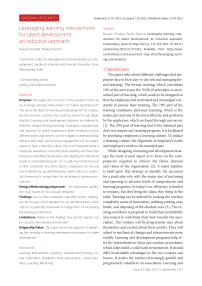Leveraging learning interventions for talent development: an inductive approach
Автор: Chandel N., Sharma P.
Журнал: Cardiometry @cardiometry
Рубрика: Original research
Статья в выпуске: 22, 2022 года.
Бесплатный доступ
Purpose: The paper aims to focus on the question “How can we leverage learning interventions for talent development?” The rise in the need for learning and development for employees has become a priority and a primary reason for job dissatisfaction. Learning and development initiatives are believed to build the required through training campaigns, competencies, and exposure to critical experiences where employees across different bands and streams can be nudged to attend training, enhance their skills, and increase engagement. For an organization to have a learning culture, the most important thing is employee awareness concerning their learning and how their learning is benefiting the business and aligning the individual’s needs to organizational goals. It is usually found that because of time constraints and other factors, employees do not pay much attention to up skill themselves, which calls for a systematic framework to nudge them for inculcating a learning environment. Design/Methodology/Approach - An explorative, qualitative study based on focus groups designed. Findings: Due to time constraints and other factors, employees do not pay much attention to up skill themselves, which calls for a systematic framework to nudge them for inculcating the learning environment. Limitations: Based on the findings, few priority aspects may be crucial to the learning environment. Originality/Value: This paper serves the purpose of explaining the necessity of learning intervention techniques for talent development.
Learning interventions, learning, development learning culture, explorative, qualitative study, assessments, career planning, coaching, mentoring
Короткий адрес: https://sciup.org/148324611
IDR: 148324611 | DOI: 10.18137/cardiometry.2022.22.313322
Список литературы Leveraging learning interventions for talent development: an inductive approach
- J. Ahn, Transforming I into we in organizational knowledge creation: A case study. Human Resource Development Quarterly, 30(4), 565–582, (2019)
- D. S. Chai, The dimensions of the learning organization questionnaire (DLOQ). The Learning Organization, 25(5), 320–330, (2018).
- N. Cole, How long should a training program be? A field study of “rules‐of‐thumb.” Journal of Workplace Learning, 20(1), 54–70, (2008).
- T. N. Garavan, Collective Learning Processes and Human Resource Development. Advances in Developing Human Resources, 10(4), 451–471, (2008).
- S. C. Goh, The relationship between learning capability and organizational performance. The Learning Organization, 19(2), 92–108, (2012).
- M. E. Jennex, (Ed.), Factors Affecting KM Implementation in the Chinese Community. Conceptual Models and Outcomes of Advancing Knowledge Management, 1–23, (2012).
- S. Jönsson, T. Muhonen, L. Denti, K. Chen, Social climate and job control as mediators between empowering leadership and learning from a cross-cultural perspective. International Journal of Cross-Cultural Management, 15(2), 135–149, (2015).
- K. Kim, K. E. Watkins, Z. Lu, (Laura), The impact of a learning organization on performance. European Journal of Training and Development, 41(2), 177–193, (2017).
- A. Kothari, N. Hovanec, R. Hastie, S. Sibbald, Lessons from the business sector for successful knowledge management in health care: A systematic review. BMC Health Services Research, 11(1), 1–11, (2011).
- W. J. Lin, C. Y. Lin, Y. H. Chang, The impact of coaching orientation on subordinate performance: the moderating effects of implicit person theory and LMX. Asia Pacific Journal of Human Resources, 55(1), 86– 105, (2016).
- I. R. Management Association, (Ed.), Human Resource Development and Technology Integration. Human Resources Management, 152–168, (2012).
- M. Matsuo, How does managerial coaching affect individual learning? The mediating roles of the team and individual reflexivity. Personnel Review, 47(1), 118–132, (2018).
- N. N. N. Nik Nazli, The factors that influence the transfer of training and its effect on organizational citizenship behavior. Journal of Workplace Learning, 30(2), 121–146, (2018).
- S. Park, Fostering organizational learning through leadership and knowledge sharing. Journal of Knowledge Management, 22(6), 1408–1423, (2018).
- M. Slavonic, Organizational Context for Effective Knowledge Sharing. Recent Advances in the Roles of Cultural and Personal Values in Organizational Behavior, 277–298, (2020).
- S. Sharma, How Have Corporate Identities Changed in India? Journal of Creative Communications, 6(3), 241–257, (2011).
- The Role of the Learning Organization to Effect Successful Change: VTC—A Case Study. Applied Degree Education and the Future of Work, 97–107, (2020).
- D. L. Truitt, The Effect of Training and Development on Employee Attitude as it Relates to Training and Work Proficiency. SAGE Open, 1(3), (2011). 215824401143333
- V. X. Wang, (Ed.), Technology and Its Impact on Educational Leadership. Technology and Its Impact on Educational Leadership, 217–233, (2012).
- N. Wickramasinghe, The Need for Developing Learning Healthcare Organizations. Advances in Healthcare Information Systems and Administration, 1–15, (2020).
- M. Yavuz, Transformational Leadership and Authentic Leadership as Practical Implications of Positive Organizational Psychology. Handbook of Research on Positive Organizational Behaviour for Improved Workplace Performance, 122–139, (2020).
- M. YAVUZ, Towards A Better Cost and Quality Structure Through Organizational Development Interventions: A Case Study. The Journal of Social Science, 1–1, (2020).


